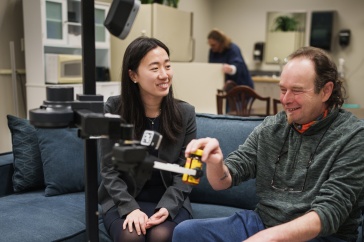
In New Hampshire, providing treatment for substance use disorders has become daunting for many providers in the state, particularly in rural areas where resources are scarce. In early 2019, the University of New Hampshire will begin training dozens of nurse practitioner students to better address New Hampshire’s opioid epidemic, one of the nation’s most severe.
Major funding from the U.S. Department of Health and Human Services' Substance Abuse and Mental Health Services Administration will allow UNH’s Institute for Health Policy and Practice and department of nursing to support the training of family and psychiatric nurse practitioner students in providing medication assisted treatment (MAT). Working together with community health providers, the UNH-based program will increase access to treatment for substance use disorders.
Through the adoption of a comprehensive opioid addiction and treatment curriculum using health information technology, the program will train approximately 50 UNH nurse practitioner students per year in MAT prescribing and management. Participating students will graduate as waivered providers, meaning they will have the knowledge and license to engage in substance use disorder treatment and prescribe alternative medications in combination with counseling and behavioral therapies.
The UNH program will also provide training for practicing nurse practitioners and physicians throughout the state, further building capacity for treating substance use disorders and strengthening partnerships the university has with community health providers. Delivered through an innovative telehealth format called Project ECHO, the program will link nurse practitioner students with community-based providers to teach best practices in treating substance use disorders. So far, five practices in two rural New Hampshire communities have signed on to participate. The Institute for Health Policy and Practice is spearheading the rollout of Project ECHO in New Hampshire.
The program will provide support to community practices struggling to meet the demand for addiction treatment, and will increase provider confidence in treating patients with substance use disorders, says Gene Harkless, chair of the department of nursing.
“As one of the largest providers of nurses to the New Hampshire workforce and the state’s public flagship university, it’s critical that UNH take a leadership role in addressing this major health crisis,” Harkless says. “We look forward to being part of the effort to increase much-needed access for patients seeking substance use disorder treatment, as well as to better preparing our students to enter the workforce with a critical knowledge set.”
-
Written By:
Callie Carr | UNH College of Health and Human Services | callie.carr@unh.edu | 603-862-0970
















































